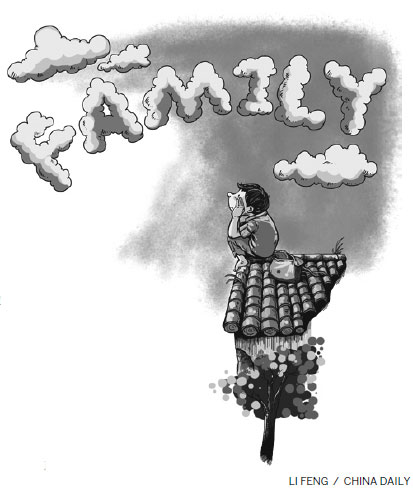
The recent deaths of four left-behind children in Bijie, Southwest China's Guizhou province, have shocked the nation. But instead of only trying to resolve the direct causes of the tragedy, the authorities should also address the deep social problems that lead to such tragedies.
President Xi Jinping has recently reiterated the importance of poverty relief during the 13th Five-Year Plan (2016-20), which in fact points out the right direction to eradicate the root cause of the sufferings of the left-behind children. Moreover, the government needs to invest more in a proper social welfare system to prevent and cope with such risks.
The lack of parental care and guidance leads to Bijie-like tragedies. Family is crucial to children's healthy development. Unfortunately, some parents cannot provide care and guidance for their children. And officials ignore parents' irresponsible behavior toward their children because they wrongly assume it to be merely a "family affair", which reflects the lack of a proper social intervention and assistance mechanism when it comes to families facing difficulties.
On the one hand, governments at all levels lack necessary policies to deal with the problems that the huge number of left-behind children in rural areas faces. Many cities benefit from migrant workers' economic contribution without providing public service of an equal measure for their families.
Many migrant workers suffer the consequences of long-term separation from their families. In rural areas, social services vis-à-vis these children, wives and senior citizens are obviously insufficient.
China has more than 200 million migrant workers and hundreds of millions of left-behind children, wives and senior citizens in rural areas. Rapid urbanization will force more rural people to leave their homes to work in cities. More children in rural areas are likely to encounter the difficulties the four children in Bijie faced. To prevent similar tragedies, therefore, officials at all levels have to deepen the social welfare system reform.
The central government should start by urging urban local governments to provide more equal and comprehensive public service to the non-household population, in order to protect all citizens' rights. The urban authorities should also create conditions that would enable migrant workers to meet their families, especially children, more often. And rural authorities should establish a sound social welfare system to meet the left-behind group's needs.
The higher authorities should also improve the urban-rural social service. The basic social service system is all about building a sound infrastructure for grassroots social management to help improve people's livelihood. This should include employment, education, healthcare, social security and housing, as well as services targeting special groups (senior citizens, children, disabled people and migrant workers) such as social assistance, mediation to resolve disputes, psychological guidance and skill training.
After the basic demands like education and healthcare are met in a majority of areas, the authorities should take measures to meet the psychological needs of the left-behind group such as improving their quality of life and overall well-being.
Moreover, the authorities should also pay attention to training professionals for social work. In a pluralistic society, traditional workers face great challenges in dealing with increasingly complicated social problems that demand a huge number of professional social workers. In Bijie's case, local officials and teachers did make efforts to help the four left-behind children but failed to prevent the tragedy because they lacked professional social workers who could have helped prevent the tragedy through their keen sense of facts.
The need, therefore, is to reflect more on the deficiencies of the existing social welfare system and build a more professional social service mechanism, which could help individuals and families cope with the pressures they encounter and thus prevent such left-behind children's tragedies.
The author is dean of Social Construction and Management Research Institute, Nankai University, Tianjin.

I’ve lived in China for quite a considerable time including my graduate school years, travelled and worked in a few cities and still choose my destination taking into consideration the density of smog or PM2.5 particulate matter in the region.